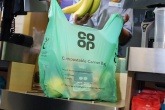WRAP publishes compostable packaging guidance
The Waste and Resources Action Programme (WRAP) has published new guidance to provide clarity on the use of compostable packaging.

Seeking to address the confusion around compostables, the new guidance includes a series of interactive decision trees to help businesses determine where they can use compostable packaging appropriately, based on current infrastructure.
The first section of WRAP’s guidance outlines the definition of ‘compostable packaging’, explaining that compostable items must either be certified to BS EN13432 or meet requirements of an appropriate home composting specification, and must be widely collected and sent to appropriate organic waste treatment sites for processing (or be suitable for home composting).
The guidance states that compostable packaging accounts for around 0.5 per cent of consumer plastic packaging in the UK, with 80 per cent of this expected to be flexible plastics, such as food waste caddy liners, and 20 per cent rigid, such as ready meal trays.
After outlining current waste management practices, including in-vessel composting (IVC) and anaerobic digestion (AD), the guidance identifies six key applications where compostable plastic packaging should be used, provided that appropriate infrastructure is in place:
- Food caddy liners
- Fruit and veg stickers
- Tea bags
- Coffee pods
- Ready meal trays
- Closed loop situations, for example, at festivals or within buildings or coffee shops
Raising concerns with the lack of established communications guidance and inconsistencies in the waste collection system, the guidance highlights the importance of communications and labelling to convey clear information about correct disposal.
Commenting on the guidance, Helen Bird, Strategic Engagement Manager at WRAP, said: “We know from research that 77 per cent of citizens believe that compostable packaging is better for the environment than other types of packaging. However, compostable plastic is still plastic, and it is no silver bullet for solving plastic pollution.
“Businesses need to be clear on when it is viable, given the complexities surrounding current treatment infrastructure. When it comes to recyclability, WRAP is clear that a claim of ‘recyclable’ should only be made if it can be recycled in practice. The same should be applied to compostable plastics. And it is critical that end markets for recycled plastics are not compromised; people need clear instruction not to place compostable plastics in the recycling bin.
“But there are certain applications where it can be a helpful alternative to conventional plastics; absolute no-brainers include fruit stickers and tea bags. This new guidance will help steer decision-making on this complex and high-profile topic.”
Investment in compostables
Compostable alternatives have the potential to play an important role as governments and businesses seek to cut down on conventional plastics.
Last Tuesday (28 January), a group of cross-party MPs and academics published a letter in the Guardian calling on the government to introduce ambitious targets for compostables, arguing that ‘compostable materials could replace a useful proportion of the non-recyclable conventional flexible plastic.’
The government has previously shown commitment to boosting development in compostables, launching a £60-million investment in July to drive innovation in bioplastics, along with a call for evidence on standards for bio-based and biodegradable plastics, the outcome of which is expected to be published shortly.
Retailers across the UK are beginning to make the switch, with Co-op and Waitrose replacing their plastic bags with compostable alternatives, which can be reused as food waste caddy liners.
However, amid growing demand for plastic alternatives, concerns have been raised over the difficulties of collecting and disposing of compostable packaging – compostables require specific treatment facilities, such as IVC, and can contaminate the recycling stream if placed along with normal plastics. Some remain cautious, with Parliament’s Environment, Food and Rural Affairs (Efra) Committee proposing that the government should focus on reducing all single-use packaging, rather than switching to compostable alternatives.
You can read the new guidance on WRAP’s website. 









